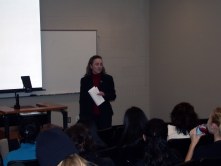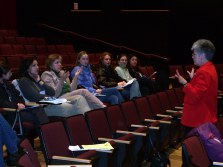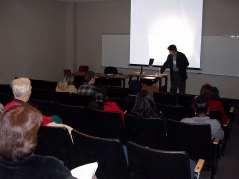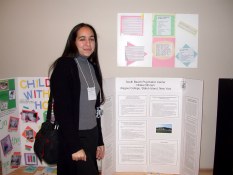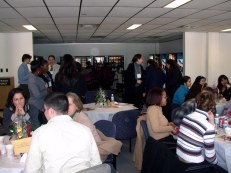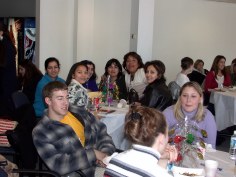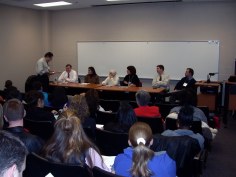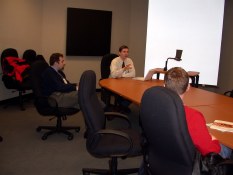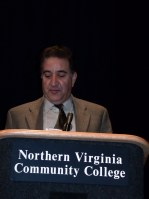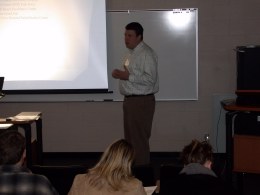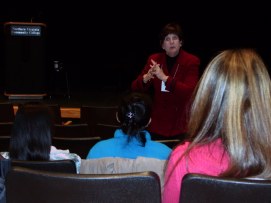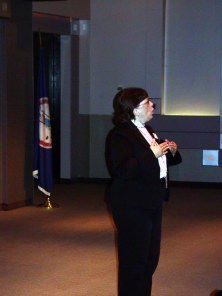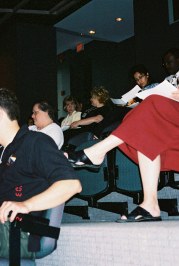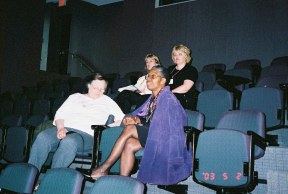SERVICE LEARNING GUIDELINES
Definition and Goals of Service Learning
For students, service learning is an opportunity to enrich and apply knowledge
learned in the classroom in applied settings. It involves active learning Ė
drawing lessons from the experience of performing service work. Your service
experience also is an opportunity for you to learn about the context in which the
service is provided and the connection between the service and your academic
course work.
Service Learning will provide you with the opportunity to:
 Learn social responsibility and citizenship skills.
Learn social responsibility and citizenship skills. Develop an ethic of service.
Develop an ethic of service. Develop civic awareness.
Develop civic awareness. Apply concepts learned in the classroom.
Apply concepts learned in the classroom. Acquire program development skills.
Acquire program development skills. Develop personality.
Develop personality. Gain academically.
Gain academically. Give something back to the community.
Give something back to the community. Experience first-hand a potential major field of study.
Experience first-hand a potential major field of study. Establish contacts and possible future employment.
Establish contacts and possible future employment. Gain experience which is a prerequisite for many jobs.
Gain experience which is a prerequisite for many jobs.
Components of Effective Service-Learning
There are three basic components of effective service-learning:
1. Sufficient preparation, which includes setting objectives for the skills to be
learned or issues to be considered; and includes planning projects so they
contribute to learning at the same time that work gets done.
2. The act of performing the actual service.
3. An analysis of the experience and the lessons learned, along with the sharing
of the experience with others as a way to reflect on the experience and its
implications. This is a way to identify and absorb what has been learned.
Thinking about the service also creates a greater understanding of the experience
and the way service addresses the needs of the community. It also promotes a
concern about community issues and a commitment to be involved as an active
citizen.
Outcomes of Service Learning
Service Learning then is a connection of theory and practice that puts concepts
into concrete form and provides a context for understanding abstract matter. This
provides an opportunity to test and refine theories as well as introduce new
theories.
Service Learning also uses knowledge with a historical understanding or
appreciation of social, economic and environmental implications as well as
moral and ethical ramifications of peopleís actions. This involves a strong use
of communication, interpersonal and technical skills.
Service Learning also involves collecting and evaluating data, relating seemingly
unrelated matters and ideas; and investigating a self-directed learning which includes
inquiry, logical thinking and a relation of ideas and experience. A transference of
learning from one context to another will allow for the opportunity to reflect,
conceptualize and apply experience-based knowledge.
Reflection: The Most Critical Aspect of Service Learning
Critical reflection is an important part of your service learning and is what distinguishes service learning from other forms of experiential education. Reflection links the
community service experience with course materials, such as readings and lectures. Reflective tools include:
 Keeping a journal
Keeping a journal Discussion
Discussion Writing portfolios
Writing portfolios In-class presentations
In-class presentations
Your reflective narrative is a major component of your grade. The guiding questions
listed below are designed to help you with your thinking and presentation.
Guiding Questions for Service Experience
Listed below are the specific questions that should guide your thinking,
development, and the outcomes of your service experience. Answers to
these questions should be included in your written report:
 What are the criteria for selection of your site?
What are the criteria for selection of your site?
 How is this site specifically related to the field of psychology?
How is this site specifically related to the field of psychology?
 What skills would you like to develop from this experience?
What skills would you like to develop from this experience?
 Are there any particular careers in psychology related to this experience?
Are there any particular careers in psychology related to this experience?
 What specific course content in your textbook, from discussions in
What specific course content in your textbook, from discussions in class, the web component of this course, or from supplementary
readings relate to this service?
 What particular theories and concepts from the course can you
What particular theories and concepts from the course can youapply to your service learning experience?
 What lessons did you learn from the experience? What did you
What lessons did you learn from the experience? What did you contribute to the experience?
 What was the expressed or stated impact of your service on the
What was the expressed or stated impact of your service on theorganization? (Note: You should receive feedback from the
organizationís administrator in your exit interview. You should also
distribute and pick up the evaluation form during the exit interview.)
 Was service learning an effective way to make class material
Was service learning an effective way to make class materialmore meaningful?
 What are the implications of your experience in this setting?
What are the implications of your experience in this setting? Can you transfer this knowledge to your life and other
Can you transfer this knowledge to your life and other professional experiences?
Student Requirements
 Eight (8) or more hours of community service in a
Eight (8) or more hours of community service in a psychology related organization.
 The development and implementation of a program proposed
The development and implementation of a program proposed by you for the organization or a project designated
specifically for you by the organization.
 A letter of understanding written by you and given to the administrator
A letter of understanding written by you and given to the administrator of the site once you have negotiated entry and received approval to do service.
This letter should indicate the specific service contributions
you will provide as agreed upon between you and the organizationís
administrator. A copy of this letter should be included
in your final report submitted to your instructor.
 Keep a journal of your activities and reflections while in the site,
Keep a journal of your activities and reflections while in the site, including your first and daily impressions, your responsibilities
and activities, and reactions to your presence in the setting.
Your journal can be a combination of written and photographic or
video-recorded essay.
 Completion of evaluation form by the student.
Completion of evaluation form by the student.
 Completion of evaluation form by the organization.
Completion of evaluation form by the organization.
 Get written verification from an administrator in the setting in which you
Get written verification from an administrator in the setting in which you do service for submission to your instructor along with your written report.
This letter should be written on the organizationís official stationary
and include the dates and time you provided service as well as the
total number of hours contributed. Place letter
as an appendix to your final report.
 Submit a final written report on your service experience with reflection
Submit a final written report on your service experience with reflection and analysis of the experience, answering the questions outlined above.
This report may also include attachments such as the organizationís brochure
and other information, or photographs of your experiences and activities in the
setting. These may be attached in the appendix or as part of your
paper. All reports are to be typewritten and presented formally
with a cover page, etc. Reports should be 3 to 10 pages in length.
 You are required to make a presentation to the class of your service
You are required to make a presentation to the class of your service experience. You should also address other issues such as placement
problems, disappointments, and integration of service with readings,
classroom discussion and lectures.
Organizational Expectations
An agency may expect some of the following from student volunteers:
 Promptness.
Promptness. Being responsible.
Being responsible. Regular attendance.
Regular attendance. Willingness to stay for the duration of a shift.
Willingness to stay for the duration of a shift. A positive attitude and an attitude of service.
A positive attitude and an attitude of service. Respect toward the organizationís environment.
Respect toward the organizationís environment. Fulfillment of duties and responsibilities.
Fulfillment of duties and responsibilities. Feedback on the appropriateness of assigned task(s).
Feedback on the appropriateness of assigned task(s). Openness to learn about other cultures and groups.
Openness to learn about other cultures and groups. Asking intelligent questions that allow you to learn the true nature of the
Asking intelligent questions that allow you to learn the true nature of theorganizationís work and mission.
Service Learning Evaluation
Your professor will make an assessment of your service learning
using some of the following criteria:
 Relationship of the setting to psychology and course content.
Relationship of the setting to psychology and course content. Written reflections on service experience.
Written reflections on service experience. Level and quality of the work performed or program implemented.
Level and quality of the work performed or program implemented. Whether student connects service experience with psychology
Whether student connects service experience with psychology content and theories.
 Whether the service experience demonstrates learning by the student.
Whether the service experience demonstrates learning by the student. The format in which the service project is displayed and presented.
The format in which the service project is displayed and presented. Whether the report includes a verification that the student was in the
Whether the report includes a verification that the student was in the setting.
 Includes evaluation of the experience by the student and the organization.
Includes evaluation of the experience by the student and the organization.
You can download Service Learning Packet from this web page below.
Examples of Activities and Sites of Service Learning Projects
 Friendship House, Leesburg, VA
Friendship House, Leesburg, VAStudent worked in psychosocial rehabilitation program providing
psychiatric services to seriously mental ill patients.
Student interacted with patients and attended
community & group meetings.
 Guiding Eyes for the Blind, Brunswick, MD
Guiding Eyes for the Blind, Brunswick, MDStudent assisted with raising puppies and training
them for the organization.
 Franklin Barn Children's Center, Herndon, VA
Franklin Barn Children's Center, Herndon, VAStudent worked with 20 children, ages 5-6 years
in a variety of educational activities.
 Open Arms Christian Child Development Center,
Open Arms Christian Child Development Center, Ashburn, VA
Student worked with 2 year olds. She read stories,
developed structured play activities and distributed snacks.
Student developed photographic essay and journal of her experiences.
This Service Learning Project won
"The Best of Fair" Award at the Spring Juried Psychology Fair.
 3 Group Service Learning Team Projects:
3 Group Service Learning Team Projects:
--Service Learning Day--
Students educated faculty, staff and the community about service
learning. Invited a YMCA senior executive as guest speaker.
Distributed literature, buttons, SL magnets
and other souvenirs for participants.
--Drink Pure Water Campaign: "I Know How I Like My Water,
But How Do You Like Yours?
Sam's Club, Dulles Plaza Crossing Shopping Center
Students distributed approximately 5,000 bottles of water to the public and
distributed literature. Students also developed an elaborate
poster display with resource listings and web sites. Literature included:
--Everything You Wanted to Know About Drinking Water But Don't Know Who To Ask--
--The Importance of Water to Human Health--
--Why Mineral Water is the Best Drinking Water--
--Top Ten Reasons We Need to Drink Water--
--What are the Health Effects of Contaminants in Drinking Water?--
--Annotated Links to Drinking Water Related Sites--
--Drinking Water Concerns--
--Children and the Risks of Contaminated Water--
--Pregnancy and Drinking Water Contamination--
 Lifespan Human Development Students Visits
Lifespan Human Development Students Visits Sunrise Center, Leesburg, VA
As final class project for segment on aging, death and dying,
the class spent a half day at Sunrise Nursing Center in Leesburg, VA.
Students made handcrafted greeting cards for residents, each with a poem.
Students made art drawings and played and sang music with instruments.
A student guitarist serenaded the group.
*********************************
Scenes from December 2003 Service Learning Symposium
"Building Bridges, Making Connections: Colleges and Communities Uniting in Partnership"
Presenter, GMU SL Community Recipient Professor, NVCC
Professor, Wagner College Wagner Student-Poster Presentation Luncheon Student Roundtable
Lunch Community Panel Campus Compact Presenters
Keynote Speaker Professor, Wagner College Professor, NVCC
*****************************
Scenes from Service Learning Institute
Center for Innovative Technology, May 2003
"Partnering With the American Red Cross"
Student Opening Institute Trainer, American Red Cross Facilitator, CCBC-Catonsville Campus
Participants Faculty
Service Learning Links
SERVICE LEARNING POWERPOINT PRESENTATION
Please Note:
Downloading this presentation works much better in a Netscape 6 Browser. From Netscape,
it will open up right on the page. In the Internet Explorer Browser, you will need to download
the file and then open it. This is a large file, so you may want to get download software that
will enable you to download files faster. I found "Netzip Download Demon" on the Internet for free.
You will still need to have PowerPoint on your computer to open the downloaded documents.
*********
Guidelines - Service Learning - Student Packet in Adobe PDF
************
